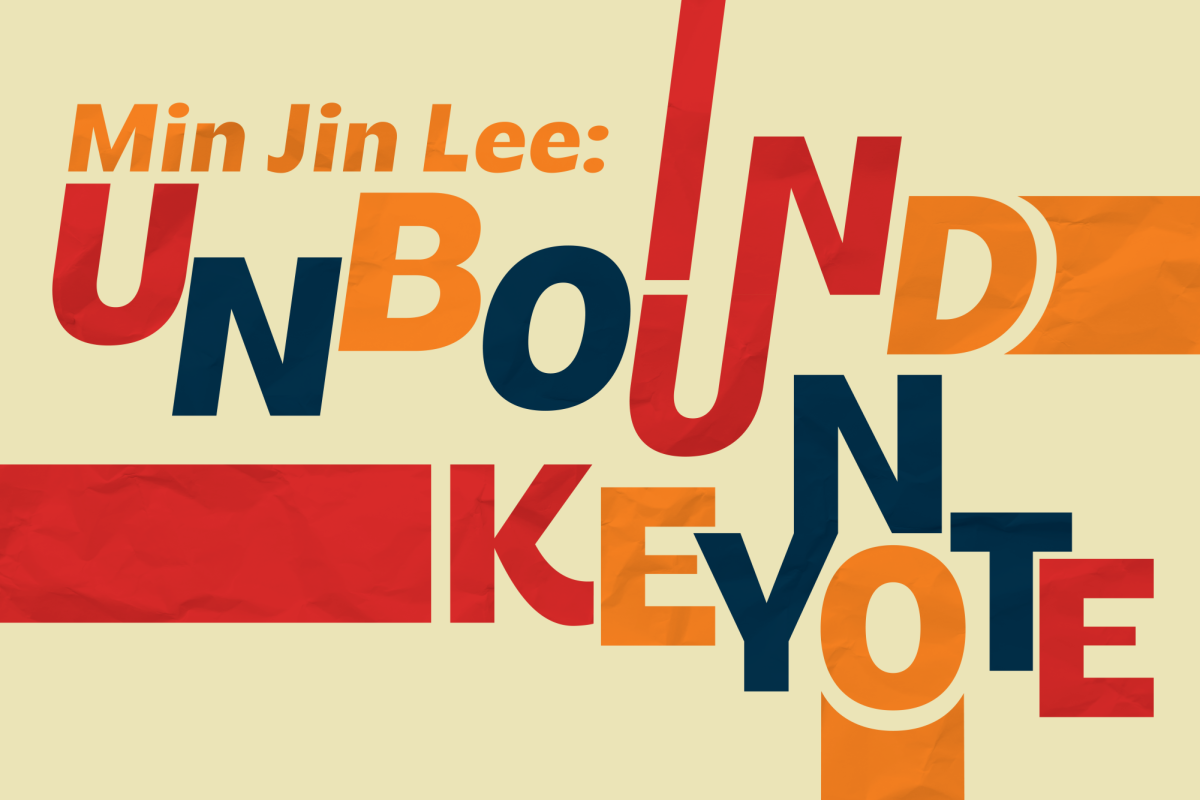
Jack Andersen
Book lovers from around Columbia gathered in Jesse Auditorium on Friday, April 18 to listen to Unbound Book Festival’s 2025 keynote speaker, Min Jin Lee.
The event started with an introduction from outgoing Unbound Executive Director Alex George and College of Arts & Sciences Dean Cooper Drury. After a speech from Lee, she then addressed questions from moderator Crystal Hana Kim.
Lee is the author of “Free Food for Millionaires” and “Pachinko,” as well as multiple essays. Most of her works delve into themes of class, race, gender and identity.
Early on as a writer, Lee was published in Columbia’s Missouri Review for her piece entitled “Motherland.” It was an early version of what later became “Pachinko,” Lee’s second book, which won a number of awards and was recognized on the New York Times’ Best Books of the 21st Century list. However, when starting “Pachinko,” Lee never expected it to gain as much fame as it did.
“I didn’t think that it had any commercial appeal, because I wrote about this obscure ethnic minority group in another country, and it’s basically about Asians within an Asian country,” Lee said.
In her opening words to the audience, Lee detailed parts of her experience immigrating to the United States from Korea at the age of 7, and how that background makes its way into her work. For instance, she shared a memory of when her father worked at a newspaper stand in the U.S., whereas the family had been considered well-off in Korea.
“I remember going to the store with him when I was a little girl, and he would wear a coat and tie
because he saw himself as a white-collar person,” Lee said. “And I remember somebody bought the daily news from him, and they threw the dime at him, and it fell on the floor, and he had to pick it up with his daughter watching.”
In sharing that story, Lee explained that she was also expanding on class and status, in the same way books can be telling stories while expanding on these themes that educate people.
“I have a clear agenda, and this is my agenda. I am going to make you Korean,” Lee said in her speech. “Through characters and the plot, point of view, tones, setting, and through recognition, reversal and catharsis, I am hoping that you will become Korean because, you see, I know that is what stories can do.”
As a graduate of Yale College with a history degree, research is a crucial factor in Lee’s writing. She looks at primary documents and conducts field work, ultimately contributing to the thorough details in her books.
“Every time I did research, it nourished me. It nourishes me now, it really does,” Lee said.
Lee said it took over 11 years to publish her first novel after quitting her job as an attorney.
“I was working the whole time I was writing, but I wasn’t having any success, and it was very humiliating for me and difficult because I didn’t know how difficult it was to write these omniscient novels that I wanted to write,” Lee said.
While Lee’s books are fiction, they are based on real happenings in society, such as class, status, immigration and identity. Publishing these books serves as a way to educate and to shed light on stories that otherwise may not be told.
“I think that the lives of ordinary people matter intensely, and they certainly matter intensely to each other,” Lee said. “So even if I’m not a famous person or I’m not a wealthy person or a person who even has a job, it doesn’t mean that my life or my heartbreak doesn’t matter, and it doesn’t mean that I’m not affected by the choices of other people around me. So I think that how an individual struggles against the canvas of history and politics when you are more or less powerless or despised, it doesn’t matter that we don’t have epic stories within us.”
Edited by Alyssa Royston | [email protected]
Copy edited by Emma Short and Ava Mohror | [email protected]
Edited by Annie Goodykoontz | [email protected]